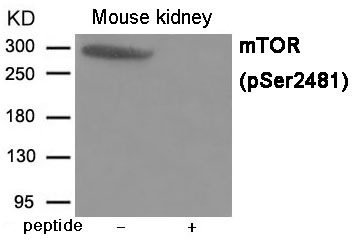购物车
 您的购物车当前为空
您的购物车当前为空
别名 p-mTOR (Ser2481), p-mTOR (S2481), mTOR (p-Ser2481), mTOR (p-S2481)
Anti-Phospho-mTOR (Ser2481) Polyclonal Antibody 是一种 Rabbit 抗体,靶向 Phospho-mTOR (Ser2481)。Anti-Phospho-mTOR (Ser2481) Polyclonal Antibody 可用于 WB。
Anti-Phospho-mTOR (Ser2481) Polyclonal Antibody 是一种 Rabbit 抗体,靶向 Phospho-mTOR (Ser2481)。Anti-Phospho-mTOR (Ser2481) Polyclonal Antibody 可用于 WB。
| 规格 | 价格 | 库存 | 数量 |
|---|---|---|---|
| 50 μL | ¥ 1,495 | 5日内发货 | |
| 100 μL | ¥ 2,235 | 5日内发货 |
| 产品描述 | Anti-Phospho-mTOR (Ser2481) Polyclonal Antibody is a Rabbit antibody targeting Phospho-mTOR (Ser2481). Anti-Phospho-mTOR (Ser2481) Polyclonal Antibody can be used in WB. |
| 别名 | p-mTOR (Ser2481), p-mTOR (S2481), mTOR (p-Ser2481), mTOR (p-S2481) |
| Ig Type | IgG |
| 反应种属 | Human,Mouse,Rat |
| 验证活性 | 1. Western blot analysis of extracts from Mouse kidney tissue using mTOR (Phospho-Ser2481) Antibody TMAC-02672. The lane on the right is treated with the antigen-specific peptide.  |
| 应用 | WB |
| 抗体种类 | Polyclonal |
| 宿主来源 | Rabbit |
| 构建方式 | Polyclonal Antibody |
| 纯化方式 | Antibodies were produced by immunizing rabbits with synthetic phosphopeptide and KLH conjugates. Antibodies were purified by affinity-chromatography using epitope-specific phosphopeptide. Non-phospho specific antibodies were removed by chromatogramphy using non-phosphopeptide. |
| 性状 | Liquid |
| 缓冲液 | Supplied at 1.0mg/mL in phosphate buffered saline (without Mg2+ and Ca2+), pH 7.4, 150mM NaCl, 0.02% sodium azide and 50% glycerol. |
| 研究背景 | Serine/threonine protein kinase which is a central regulator of cellular metabolism, growth and survival in response to hormones, growth factors, nutrients, energy and stress signals. Functions as part of 2 structurally and functionally distinct signaling complexes mTORC1 and mTORC2 (mTOR complex 1 and 2). Activated mTORC1 up-regulates protein synthesis by phosphorylating key regulators of mRNA translation and ribosome synthesis. This includes phosphorylation of EIF4EBP1 and release of its inhibition toward the elongation initiation factor 4E (eiF4E). Moreover, phosphorylates and activates RPS6KB1 and RPS6KB2 that promote protein synthesis by modulating the activity of their downstream targets including ribosomal protein S6, eukaryotic translation initiation factor EIF4B and the inhibitor of translation initiation PDCD4. Regulates ribosome synthesis by activating RNA polymerase III-dependent transcription through phosphorylation and inhibition of MAF1 a RNA polymerase III-repressor. In parallel to protein synthesis, also regulates lipid synthesis through SREBF1/SREBP1 and LPIN1. To maintain energy homeostasis mTORC1 may also regulate mitochondrial biogenesis through regulation of PPARGC1A. mTORC1 also negatively regulates autophagy through phosphorylation of ULK1. Under nutrient sufficiency, phosphorylates ULK1 at 'Ser-758', disrupting the interaction with AMPK and preventing activation of ULK1. Also prevents autophagy through phosphorylation of the autophagy inhibitor DAP. mTORC1 exerts a feedback control on upstream growth factor signaling that includes phosphorylation and activation of GRB10 a INSR-dependent signaling suppressor. Among other potential targets mTORC1 may phosphorylate CLIP1 and regulate microtubules. As part of the mTORC2 complex MTOR may regulate other cellular processes including survival and organization of the cytoskeleton. Plays a critical role in the phosphorylation at 'Ser-473' of AKT1, a pro-survival effector of phosphoinositide 3-kinase, facilitating its activation by PDK1. mTORC2 may regulate the actin cytoskeleton, through phosphorylation of PRKCA, PXN and activation of the Rho-type guanine nucleotide exchange factors RHOA and RAC1A or RAC1B. mTORC2 also regulates the phosphorylation of SGK1 at 'Ser-422'. |
| 偶联 | Unconjugated |
| 其他可选修饰符 | Phospho |
| 免疫原 | Peptide sequence around phosphorylation site of Serine 2481 (I-H-S(p)-F-I) derived from Human mTOR |
| 抗原种属 | human |
| Uniprot ID |
| 分子量 | Actual: 288 kDa. |
| 储存方式 | Store at -20°C or -80°C for 12 months. Avoid repeated freeze-thaw cycles. |
| 运输方式 | Shipping with blue ice. |